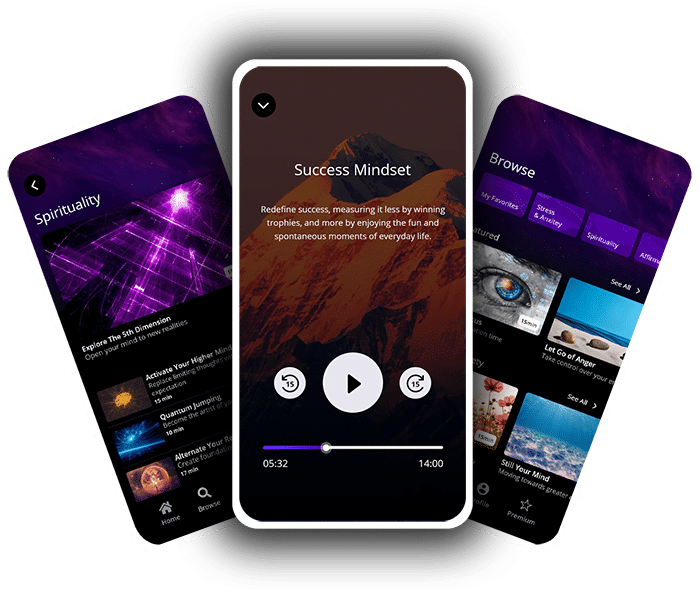Ever found yourself feeling sleepy after a calming session of meditation? It’s a widespread occurrence and can be linked to the brain waves that become active during our meditative state.
This blog post aims to delve into possible causes and practical solutions for post-meditation sleepiness, ensuring your sessions remain both restorative and energizing. Curious about learning how you can combat this common issue? Keep reading!
Try guided meditations to avoid sleepiness or feeling tired after meditation.

Unleash Your True Potential!
Explore the world of meditation with our powerful guided sessions crafted to bring peace and strength to your spirit.
But first, let’s ensure our sessions are the perfect fit for you.
Take our short quiz to find out!
Table of contents
Why Do You Feel Sleepy After Meditation?

Feeling sleepy after meditation can be caused by factors such as lack of sleep, the association between meditation and relaxation/rest, boredom or fatigue, and the timing of your meditation session.
Lack of sleep
You might feel sleepy after meditation because you’re not getting enough sleep. You may think that you need less rest, but your body says otherwise. This can be a big cause of why you’re falling asleep while meditating.
Being tired makes it hard for all parts of your life, including when you try to focus on relaxing your mind during meditation. So get a good night’s sleep! It is also what Deepak Chopra suggests.
He thinks falling asleep during the quiet time could show that you don’t get enough rest at night.
Association with relaxation and rest
Meditation is all about finding peace. Your body enters a state of rest during this quiet time. It is deeper than the ease you get from sleep. This makes some people feel sleepy after meditation.
This feeling isn’t bad at all. It shows you have done it right and your body could relax totally. Over time, as your brain gets used to this deep calm, you might not feel so tired out anymore.
Boredom
You might feel bored during meditation. This can happen if you do not get the results you want. You may also feel this when you are not into your practice much. Every person has their own way to deal with boredom.
A break may help some people, while others may need new ways to meditate. Talking with a teacher about it could also be a good idea.
Fatigue
Feeling tired after meditation is a common experience, especially for beginners. Fatigue can occur because our bodies are not used to the process of meditation and the relaxation it brings.
It’s important to listen to your body and give yourself rest if needed, as pushing too hard can leave you feeling drained. Remember, falling asleep during meditation is often a sign of being tired rather than the meditation itself making you tired.
Meditation is actually believed to help alleviate feelings of fatigue in the long run by reducing stress and improving mental clarity. So don’t worry if you feel sleepy after meditating – just take it as a sign that your body needs some extra rest!
Timing of meditation
The timing of your meditation practice can also affect how sleepy you feel afterwards. For example, if you meditate right before bed, it’s natural to feel tired because your body associates this time with sleep.
On the other hand, if you meditate when you’re already feeling tired or fatigued, it may increase drowsiness. Experimenting with different times of day to find what works best for you can help prevent feeling sleepy after meditation.
Rumors vs. Reality
There may be some rumors floating around about feeling sleepy after meditation, but let’s separate fact from fiction. One common rumor is that feeling sleepy means your meditation didn’t work or that you did something wrong.
The reality is that feeling sleepy can actually be a sign of deep relaxation and letting go of stress. It’s perfectly normal to feel relaxed and calm after meditation, which can naturally lead to drowsiness for some people.
Another rumor is that feeling sleepy during meditation means you’re not doing it right. However, allowing yourself to rest and even fall asleep during meditation can actually help promote better sleep quality overall.
So don’t worry if you find yourself dozing off – it might just mean your body needs the rest!
How to Prevent Feeling Sleepy After Meditation

To prevent feeling sleepy after meditation, ensure you are getting enough sleep and try changing up your routine or exploring different techniques.
Ensure enough sleep
To prevent feeling sleepy after meditation, make sure you get enough sleep. Research shows that lack of sleep is often the cause of feeling tired after meditation, not the meditation itself.
When you don’t get enough sleep, it’s normal to feel tired and have difficulty concentrating. So, before you start your meditation practice, try to ensure that you have had a good night’s rest.
This will help you stay more alert and focused during your session and reduce the likelihood of feeling sleepy afterwards.
Change up your meditation routine
To prevent feeling sleepy after meditation, you can try changing up your routine. Here are some suggestions:
- Vary the duration: Instead of always meditating for the same amount of time, try different lengths of sessions. Shorter sessions may help keep you more alert and focused.
- Experiment with different settings: If you usually meditate in a quiet room, try meditating outdoors or in a different environment to stimulate your senses and keep yourself awake.
- Use guided meditation: Switching from silent meditation to using guided meditation apps or recordings can help keep your mind engaged and prevent drowsiness.
- Incorporate movement: Instead of remaining still throughout the entire session, include gentle movements like stretching or walking meditation to stay energized.
- Change the time of day: If you consistently feel sleepy during morning or evening meditations, try practicing at a different time when you tend to be more awake and alert.
Try different meditation techniques
To prevent feeling sleepy after meditation, you can try different techniques. Here are some options:
- Mindfulness meditation: Focus on your breath or senses to bring your attention to the present moment.
- Guided visualization: Imagine yourself in a peaceful and energizing place, using all your senses to create a vivid experience.
- Loving-kindness meditation: Direct positive thoughts and well wishes towards yourself and others, cultivating feelings of empathy and compassion.
- Body scan meditation: Bring awareness to each part of your body, starting from the top of your head down to your toes, relaxing and releasing tension along the way.
- Mantra meditation: Repeat a specific word or phrase silently or out loud, allowing it to help calm and center your mind.
Focus on your breath
When you focus on your breath during meditation, it can help bring your attention to the present moment and calm your mind. By paying close attention to every inhale and exhale, you can create a sense of relaxation and reduce stress.
This simple technique allows you to let go of distracting thoughts and brings a sense of peace and tranquility. Focusing on your breath also helps improve oxygen flow in the body, promoting physical relaxation as well.
So by taking deep, mindful breaths during meditation, you can enhance the benefits and prevent feeling sleepy afterward.
Other Benefits of Meditation
Meditation offers a range of benefits, including reduced stress levels and anxiety, improved mental clarity, and enhanced productivity.
Reduced stress and anxiety
Meditation is known to have many advantages, and one of them is reducing stress and anxiety. When you meditate, you focus on your breath or a specific object, which helps calm your mind.
This can lead to decrease in cortisol levels, a hormone responsible for stress. Consistent meditation practice has been found to lower anxiety levels and improve overall well-being.
It allows you to be more present in the moment and helps cultivate a sense of inner peace. So if you’re feeling stressed or anxious, give meditation a try!

Unleash Your True Potential!
Explore the world of meditation with our powerful guided sessions crafted to bring peace and strength to your spirit.
But first, let’s ensure our sessions are the perfect fit for you.
Take our short quiz to find out!
Improved mental clarity
Regular meditation has been found to have numerous benefits, including improved mental clarity. When you meditate on a regular basis, it helps to calm your mind and reduce the noise and distractions that can cloud your thinking.
As a result, you may find that you are able to think more clearly and make decisions more easily. By taking the time to sit in silence and focus on your breath or any specific point of concentration, you are training your mind to stay present and focused throughout the day.
Practicing meditation regularly can also enhance cognitive function. Studies have shown that practicing meditation can increase grey matter in certain areas of the brain responsible for attention and memory.
Enhanced productivity
Meditation has been shown to enhance productivity in various areas of life. When you regularly practice meditation, it can improve your concentration, memory, creativity, emotional intelligence, and motivation.
This means that you will be better able to focus on tasks at hand, remember important information more easily, come up with innovative ideas, understand and manage your emotions effectively, and stay driven towards achieving your goals.
By incorporating meditation into your routine life, you can experience these benefits and feel more energized and focused throughout the day. So if you’re looking for ways to boost your productivity levels, consider giving meditation a try!
Conclusion
Feeling sleepy after meditation is quite common. It can be caused by the lack of sleep, the association between relaxation and rest, boredom, fatigue, or the timing of your meditation practice.
While falling asleep during meditation is not necessarily a bad thing, there are solutions to help prevent it. Ensuring you get enough sleep, changing up your meditation routine, trying different techniques, and focusing on your breath can all help keep you alert and engaged during your practice.
So don’t worry if you feel sleepy after meditation – just try out these solutions and reap the many other benefits that meditation has to offer!
FAQs
Why do I feel sleepy after meditation?
You might feel sleepy after meditation as it helps to relax your body and mind, which can lead you to fall asleep.
Is feeling tired after meditating normal?
Yes, feeling a bit tired or sleepy after meditation is common as your body is in a state of deep relaxation.
What should I do if I always feel sleepy after meditation?
If you always feel sleepy after meditating, try changing the time when you meditate or where you perform the practice.
Can there be other reasons why I get tired from meditation?
Yes, if you are not getting enough rest at night or overthinking during mediation, that could also make you feel tired afterward.










